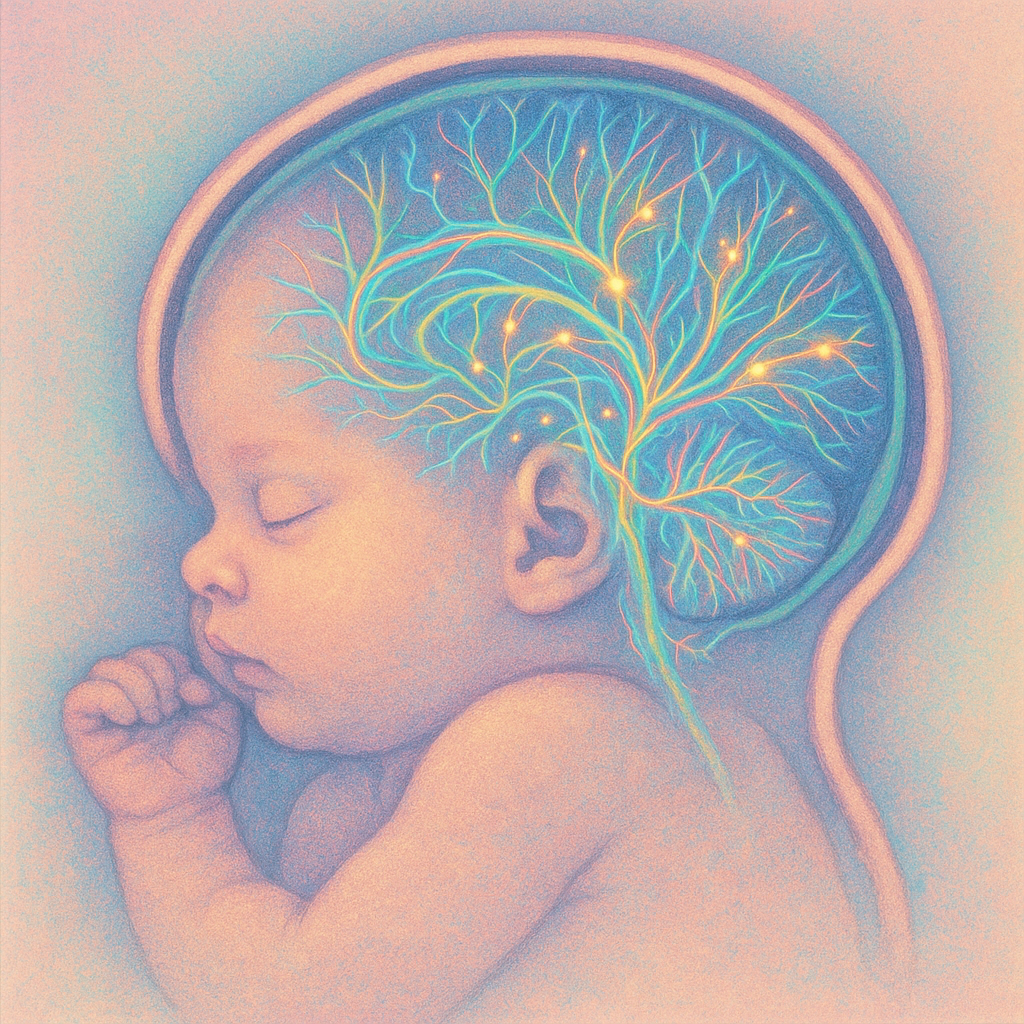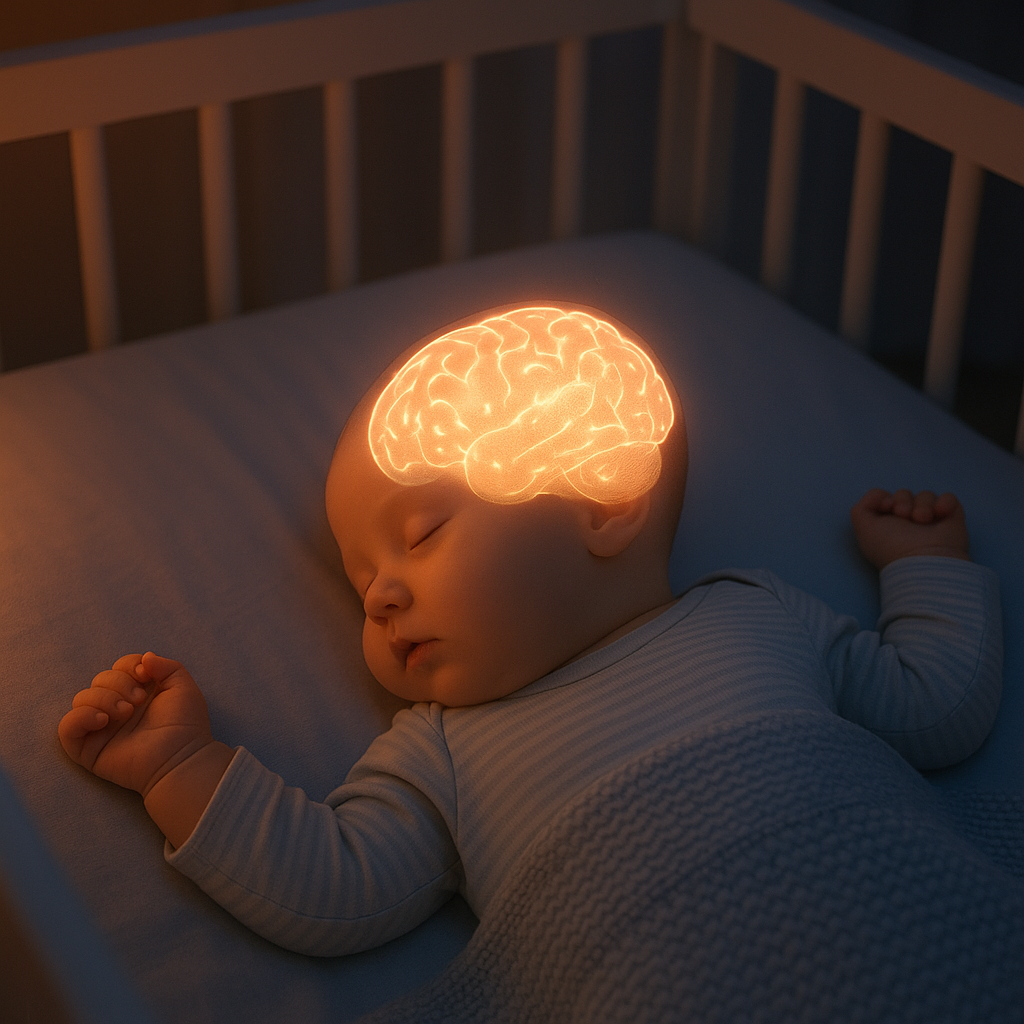Babies given formal sleep training add an average of just 16 extra minutes of unbroken shut-eye each night. That surprising number has many parents wondering: is the tiny gain worth the tears, or do those 2 a.m. feedings quietly nourish growing brains? The evidence shows that both sleep-training and riding out night wakings can fit within normal, healthy development—yet they influence the brain in very different ways. Let’s dive below for more insights.
- How Does Sleep Rebuild Your Baby’s Brain Each Night?
- When You Sleep-Train, Do Babies Wake Less or Just Stop Signaling?
- Does Sleep Training Help or Harm Your Baby’s Brain and Emotions?
- Are Night Wakings Bad for Brain Growth—or Secretly Beneficial?
- How Can You Choose Between Sleep Training and Responsive Night Parenting?
- What Don’t We Know Yet About Infant Sleep and Brain Development?
- Quick Answers to Parents’ Most-Searched Questions
- Final Thoughts
How Does Sleep Rebuild Your Baby’s Brain Each Night?
Sleep is a powerhouse for your baby’s brain, driving synapse growth, myelination, and memory consolidation. During rapid eye movement (REM) and non-REM (NREM) sleep cycles, billions of neural connections form and strengthen, unused pathways are pruned, and white matter thickens to support critical skills like language, attention, and motor coordination.
Key insights for parents:
- Infants averaging 12–15 hours of daily sleep between 4–11 months show up to 36% greater white-matter volume by age one, linked to better language and motor skills. Learn more about the relationship between infant sleep and brain development.
- Sleep efficiency (the percentage of time actually asleep) predicts stronger executive function, like problem-solving, by toddlerhood.
- Brief “arousals” every 60–90 minutes are normal for infants; however, excessive fragmentation (six or more full wakings per night) may lower cognitive scores.
To dig deeper into the neuroscience of shut-eye, visit How Sleep Boosts Your Baby’s Brain.

When You Sleep-Train, Do Babies Wake Less or Just Stop Signaling?
Sleep-trained babies wake as often but signal for help less. Methods like graduated extinction reduce parent-reported night wakings by about 80%, but actigraphy data show no change in physiological wakings. Explore the effects of sleep training on infant sleep patterns.
Here’s what happens:
- The longest uninterrupted sleep stretch extends by about 16 minutes on average.
- Maternal depression scores drop by 11% within three weeks, easing family stress.
- Roughly 1 in 5 infants, especially those under 6 months or with sensitive “orchid” temperaments, show no improvement.
Sleep training teaches babies to link sleep cycles independently, not to eliminate wakings. A soothing pre-bed routine—think dim lights, lullabies, or a warm bath—can amplify benefits with less crying. Learn more at How to Create a Sleep Routine for Better Baby Brain Health.
Does Sleep Training Help or Harm Your Baby’s Brain and Emotions?
High-quality studies find no long-term harm or benefit to cognition or attachment from sleep training. Australian trials tracking children to age six show identical IQ scores, stress-hormone levels, and secure-attachment rates in sleep-trained and non-sleep-trained children. Discover the long-term effects of behavioral infant sleep interventions. Salivary cortisol spikes during the first few nights of crying but normalizes within a week. Understand how sleep training affects infant stress levels.
Important nuance parents should know:
- Only 1 in 10 infants keeps “trained” sleep gains past six months without booster sessions.
- No imaging studies have captured real-time brain activity during prolonged crying episodes; experts still debate whether silence equals “self-soothing” or learned helplessness.

Are Night Wakings Bad for Brain Growth—or Secretly Beneficial?
Moderate night (1–2 per night) wakings can support development, but chronic fragmentation may hinder it. Up to two wakings per night may offer benefits, while excessive wakings or insufficient sleep can pose risks.
Why a couple of wakings may help:
- They sustain prolactin and oxytocin levels, supporting breastfeeding, which boosts cognitive development.
- Evolutionarily, light sleep reduces sudden infant death syndrome (SIDS) risk by preventing overly deep, unarousable states.
- A 2022 study links about two wakings per night to equal or better problem-solving scores at 18 months. Read about the relationship between infant sleep and cognitive development.
When to worry:
- More than six full wakings after 18 months or total daily sleep below 11 hours for several months is linked to slower fine-motor and language development. If this persists, consult your pediatrician or explore Baby Sleep Regressions: Why They Happen and How to Cope.
How Can You Choose Between Sleep Training and Responsive Night Parenting?
This decision depends on your baby’s age, temperament, and your family’s needs. Use this guide to decide:
- Age: Under 6 months? Focus on feeding and responsiveness. 6–24 months? Both sleep training and responsive parenting are safe.
- Temperament: “Dandelion” babies adapt quickly; “orchid” babies may need gentler methods.
- Parental Well-Being: If exhaustion fuels anxiety or depression, structured sleep strategies can support mental health.
- Cultural Values: Co-sleeping is common in many cultures; solitary sleep isn’t required for development. Learn more at Co-Sleeping vs. Crib: Best for Your Baby’s Brain?.
- Hybrid Approaches: The “camp-out” method—staying near the crib and gradually increasing distance—reduces cortisol spikes while fostering independence.
Practical Step: Track your baby’s sleep with a three-night sleep diary using a notebook or an actigraphy app like Baby Sleep Tracker to compare perceived vs. actual wakings.
What Don’t We Know Yet About Infant Sleep and Brain Development?
While research on infant sleep and brain development has advanced, significant gaps remain that limit our full understanding. These gaps highlight areas where science is still catching up, leaving parents and researchers with unanswered questions:
- Real-time neuroimaging during crying episodes: No studies have used advanced imaging to map limbic system activity (related to emotions) during prolonged crying, so we don’t fully understand its impact on the brain.
- Data on diverse populations: Limited research exists on preterm infants, foster children, or babies from varied cultural backgrounds, where sleep practices and developmental needs may differ.
- Long-term studies beyond 10 years: Few studies compare the effects of strict sleep training (e.g., extinction methods) versus responsive caregiving on stress reactivity over a decade or more.
- Objective measures for early sleep training: For infants under 6 months, we lack detailed data on sleep architecture (the structure of sleep cycles) during training, making it hard to assess its effects. Explore current research on infant sleep and brain development.
Safe-sleep basics always matter; review them in Safe Sleep Practices for a Healthier Baby Brain.
Quick Answers to Parents’ Most-Searched Questions
-
Does sleep training harm attachment?
No. Large studies show identical secure-attachment rates at preschool age for sleep-trained and non-sleep-trained babies. Discover the long-term effects of behavioral infant sleep interventions. -
Will my baby self-soothe without training?
Likely. About 89% of five-month-olds who wake at night sleep through by age 4.5 without intervention. -
Can frequent wakings slow brain growth?
Only if severe. Chronic sleep below 11 hours/day for months, not occasional wakings, predicts slower development. -
Are naps as critical as night sleep?
Yes. Naps consolidate memories and language skills. Explore Why Naps Boost Your Baby’s Memory.
Final Thoughts
Whether you embrace sleep training, cherish midnight cuddles, or land somewhere in between, the evidence is reassuring: warm, responsive parenting and enough total sleep trump the exact path you take. Trust your instincts, track what truly happens at night, and remember—confidence, not perfection, is what lets every family member’s brain thrive.